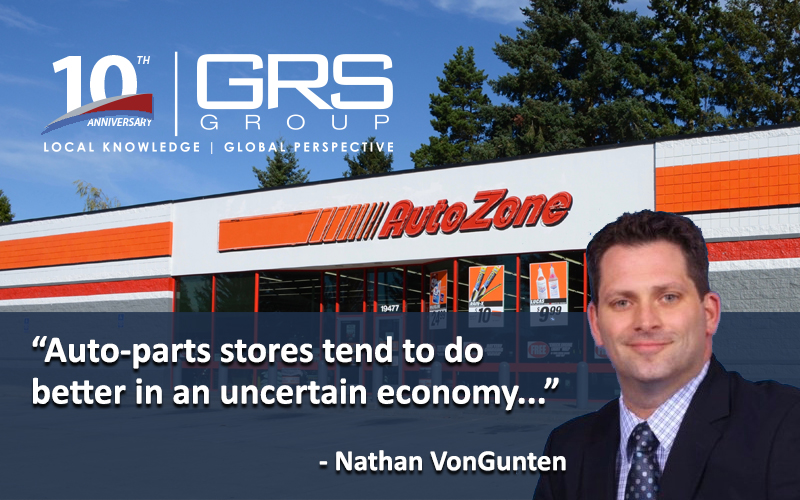Nathan VonGunten is a senior vice president at GRS Group. He can be reached at 330.242.1991 or via email at nvongunten@fv2.d32.myftpupload.com
Auto-parts stores tend to do better in an uncertain economy.
There is a reason why AutoZone, even on a bad day, trades at more than $800 per share, and had a significant stock-price increase since the recession. It’s because people buy less cars during a downturn during a recession, and many consumers have gotten tighter with their budgets since the financial crisis that started in 2007 and are more into DIY solutions, if they can figure them out.
As of the end of the fourth quarter, we were still in an economy on fire, but auto sales were still down across manufacturers. Despite that, capitalization rates increased significantly across the main three auto-parts retailers, according to a report by The Boulder Group.
But will they remain the same after the COVID-19 outbreak in the U.S., when less people are likely to purchase new vehicles?
As it stands, though cap rates increased for auto-parts retailers overall, they were still low. Cap rates at AutoZone rose 23 basis points year over year in the fourth quarter, though they were still 5.47 percent. Advance Auto Parts saw a 20-percent cap-rate rise, hitting 6.95 percent; O’Reilly Auto Parts’ only crept up five points, to 5.85 percent.
Last year, transaction volume for assets tenanted by these types of tenants increased six percent from the prior year, according to Boulder. It said: “The low absolute price point of properties within the net lease auto parts store sector make these investments attractive to investors. Outside of dollar stores, there is a limited supply of net leased properties available under $2 million leased to investment grade rated tenants.”
Though AutoZone is the leader in its strong valuation, Boulder says Advance has the leading market percentage by tenant properties sold, at 56 percent, O’Reilly is at 19 percent, and Autzone is at 19 percent.
Though COVID-19 could hurt commercial real estate investment for a time, the availability of new cars, and consumers’ interest in purchasing them, will certainly be impacted, with automakers closing their factories in the United States. So, it could possibly be a good time for investors to consider these investments if people are looking to increasingly self-service their older vehicles, as they did during the Great Recession.
About GRS Group
On the leading edge of innovation in commercial real estate transactions, Global Realty Services Group provides its clients with unsurpassed expertise in the areas of Transaction Services, Title Insurance and Sustainability Solutions. With offices across the United States, Europe, and affiliates around the globe, GRS Group provides local market knowledge with a global perspective for institutional real estate investors, occupiers and lenders worldwide. The GRS Group team has evaluated and advised on over $1 trillion in CRE transactions.

